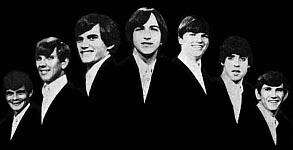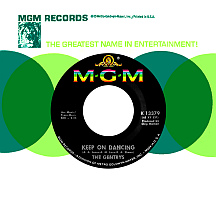THE GENTRYS
Keep On Dancing
Guitarist Larry Raspberry started a group called The Gents, formed in 1963 at Treadwell High on the east side of Memphis, Tennessee. Singers Jimmy Hart and Bruce Bowles, bassist Pat Neal, trumpeter Jimmy Johnson, drummer Larry Wall and multi-instrumentalist Bobby Fisher rounded out the seven-man outfit, local favorites with the teen crowd and winners of a 1964 "Battle of the Bands" competition after contemporizing their name a bit. On the strength of local popularity, The Gentrys booked studio time with Chips Moman, already well known around town as a crack producer with a knack for making hits (he produced many of them as the decade progressed). "Sometimes," a remake of Texan Gene Thomas's 1961 hit ballad (recorded by Paul Revere and the Raiders at about the same time), came out regionally on the small Youngstown label and received a smattering of airplay in Memphis and a few other cities.
Memphis R&B group The Avantis debuted "Keep On Dancing," written by Allen Jones, Andrew Love and Richard Shann, in the spring of 1963 on the Argo label, a simple but effective midtempo bopper with infectious sax work ('...keep on doin' the twist...shake it, shake it, shake it baby, hey...come on and shake it like this!'). Two years later the Gentrys, with Larry singing lead, recorded a slightly faster-paced minute-and-a-half version for their second Youngstown 45, updating the dance references ('keep on-a doin' the jerk right now...shake it, shake it baby...come on and show me how you work!'), keeping the original's reference to Little Eva's "Loco-Motion" from the original intact. The first 36 seconds of the song were spliced onto the end to get it to a radio-friendly 2:08 (a reverse of the more common practice of editing songs to a shorter length for airplay). Local top 40 outlet WHBQ hit the track hard, word spread quickly, MGM Records took over and the single entered the national charts in September '65, rising to the top ten the following month.
The band toured extensively in late '65 and early '66, appearing on TV dance shows like Shindig, Hullabaloo and localized programs from coast to coast. Hit Records, a Nashville-based label notorious for releasing budget versions of popular songs by third-rate singers at 39 cents a pop, mistakenly credited the Gentrys on its knockoff version (backed with The Toys' also-hot hit "A Lover's Concerto" by the very good Alpha Zoe of Gallatin, Tennessee, a longtime songstress for Hit), creating confusion when bamboozled buyers dropped the needle into the groove. The legit Gentrys follow-up created a division among radio programmers, some preferring the A side, "Spread it on Thick" ('...like peanut butter and jam'), others flipping it for the more driving rocker "Brown Paper Sack." Both sides made minor chart appearances in January '66. The group lip-synced "Spread It" in the teen film It's a Bikini World (starring girl-next-door Deborah Walley and her eccentric love interest Tommy Kirk).

The next single, "Everyday I Have to Cry" (a nice midtempo rendition of the Arthur Alexander song that had become Steve Alaimo's biggest hit in 1963), was followed by three more 45s that barely registered against stiffer, harder-rocking competition. A delayed release of It's a Bikini World in the spring of '67 found onscreen exposure coinciding with the band being sent packing by MGM Records. A few members had been replaced in the interim so that the septet in the film didn't match the actual band (personnel, clothing style, hair length or otherwise) as it existed some 18 months earlier when they were riding high with their signature "Dancing" hit. Bell Records picked up the Gentrys for three singles; with "Susie-Q" rocker Dale Hawkins producing, "I Can't Go Back to Denver" made a little noise in southern markets.
Hart hung in as the group realigned, moving a few miles closer to downtown Memphis into Sam Phillips' Sun studios. Several single releases were produced by Sam's son Knox Phillips, starting with "Why Should I Cry" in early 1970. A cover of Neil Young's "Cinnamon Girl" actually charted before Neil's original with Crazy Horse; the two battled on the charts in mid-'70, each essentially canceling out the other's chances of hitting the top 40. A similar competition occurred in early '71 with their recording of Cat Stevens' "Wild World," only this time around it was Cat who had the hit. Later that same year, Scot quintet The Bay City Rollers kicked off their six-year U.K. hit streak with a remake of the Avantis/Gentrys "oldie-but-goodie," "Keep On Dancin'."
The group's lineup continued to fluctuate but still had some juice. One single came out on Capitol in 1972, then in '74 they again set up a few miles from home (and a few dozen blocks to the south of Sun's studios) at Stax, getting two singles out before the company folded. The Gentrys called it quits soon afterwards. Larry Raspberry started his own band, The Highsteppers. Jimmy Hart ventured into a career in a whole new arena: the Wild, Wacky Entertainment world of wrestling. As a high-profile, outspoken manager he gained a nickname, "The Mouth of the South," frequently fueling the fires of feuds between a number of skull-crushin' mat-grapplers. His frequent clashes with former Memphis disc jockey and hardheaded villainous type Jerry Lawler have become legendary in wrestling circles. Hart represented bleached-blonde, self-proclaimed pretty boy Florida wrestler Austin Idol, putting up his gold record for "Keep On Dancing" as incentive should Lawler defeat Idol in the ring, which he did. Afterwards, Jerry took Jimmy's cherished Gentrys plaque to the Mississippi River and, with cameras rolling, threw it into the famously deep, muddy waters; it's been rumored that Hart broke into tears over the stunt. To what degree this senseless spectacle was preplanned may never be known...except to the participants.


